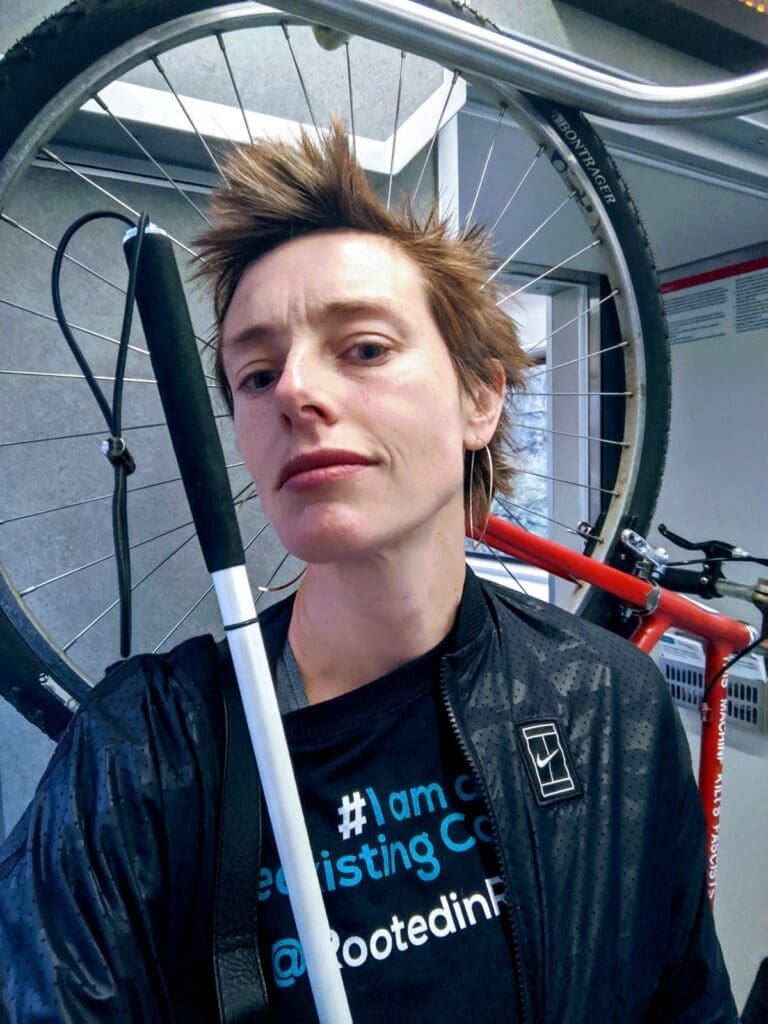This text was first posted on The Urbanist, and is reposted right here with permission.
By Anna Zivarts
Anna Zivarts revealed When Driving Isn’t an Possibility: Steering Away from Automotive Dependency with Island Press in Might 2024. The e-book outlines her expertise as a low-vision nondriver and shines a light-weight on the irritating, harmful, and typically lethal conditions involuntary nondrivers face every single day. It is a letter she wrote in response to her mom’s response to the e-book.
Mother,
I’m apprehensive your response to this e-book has been to mud off your bike and begin to bike all over the place in your exurban group. I do know your entire id is wrapped up in being powerful. That you just biked throughout the nation twice whenever you had been in your twenties. That you just climbed mountains with gargantuan hundreds educating wayward youngsters how one can survive within the wild. That you just had been in labor with me for 36 hours, decided to have a house beginning.
I really like that about you. And I really like how that has rubbed off on me. Too many youngsters with disabilities are coddled and guarded — mother and father too afraid that our variations or our “limitations” imply that it’s unsafe for us to do issues. You taught me to journey bikes though I couldn’t see the whole lot, and taught me to climb mountains though I tripped quite a bit. You trusted that I may try this and due to that I trusted myself.
I fear now that you simply’re deciphering the message of my e-book as a problem: are you able to get round with out driving? Are you able to powerful it out within the rain, up the hill, on the shoulder with automobiles zipping by?
I do know you are able to do it. And perhaps some days you need to, it may really feel good to push ourselves mentally and bodily and do one thing we checked out earlier than and thought: ‘that’s gonna be powerful.’
However that’s not the purpose. What I attempted to say with this e-book, with the folks whose tales I shared, is that you simply shouldn’t need to. Nobody ought to need to.
Not having the ability to bike up that hill within the rain at nighttime shouldn’t be perceived as a sign of ethical failure. Nor ought to having the ability to do it’s taken as an indication of valor, of greatness. You’ve been fortunate to have a physique that may do these items. Not everybody does.
Accessing our communities shouldn’t require sure our bodies.
I do know you don’t like to speak about your getting old physique, however you too will sometime attain a spot the place biking, and certain even driving, isn’t an choice.


As I’ve turned 40 and the aches and accidents take for much longer to heal, I’m beginning to perceive that my means to make use of my physique to cowl distances that I can’t drive is diminishing. Though I can’t see properly sufficient to drive, I’ve had plenty of mobility freedom since you taught me to bike and confirmed me it may very well be a path to independence.
For you, for me, for everybody else in our communities who has locations to go, folks to fulfill, issues to do, errands to run, mobility shouldn’t require a automotive. Nor ought to it require bodily energy or toughness. We’d like communities the place it’s potential to stroll or roll a brief distance to get a espresso or a roll of bathroom paper. Or for individuals who need to reside in rural areas, the place there’s a each day bus into city.
This isn’t a pipedream. We will take steps proper now to scale back automotive dependency in our communities, to put money into transit and to make it safer and extra snug to stroll, roll, or bike. And we should.
Between folks like me who can’t drive, folks too younger to drive, individuals who can’t afford to drive, and people who find themselves getting old out of driving, we make up 30% of the inhabitants. It’s time our communities began working for us. And by making the modifications that make it potential for us to get round, we will enhance the well being and wellbeing of our communities by tackling one of many largest sources of carbon emissions, along with decreasing automotive crashes and air pollution.
After all I hope you continue to journey your bike. If extra folks, particularly folks in decision-making roles, take the time to journey transit, to stroll, bike or roll, they’ll perceive higher what wants to vary and why. However I actually hope — along with driving your bike — you present up on the subsequent metropolis council assembly to battle for sidewalks and transit funding. Or perhaps even a direct bus connection to Seattle so I can come go to you (and you may go to me, when you cease driving).
Love, Anna
This text was reposted with permission from Douglas Trumm, Writer of The Urbanist.
Be a part of America Walks and Incapacity Rights Washington and join the #WeekWithoutDriving






















